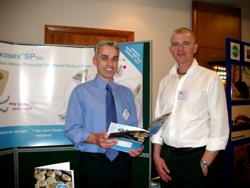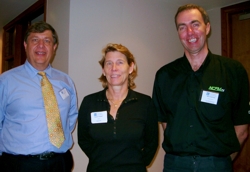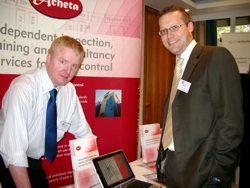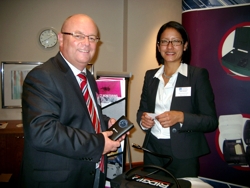The challenge of controlling stored product insect pests in a post methyl bromide world was the subject for an interesting, one-day seminar held at the Holiday Inn High Wycombe on 23 September.
Life After Methyl Bromide 2 highlighted the amount of lateral thinking that is being employed to prevent and control stored product insect (SPI) pest problems now that the mainstay of factory fumigation has been largely consigned to the history books. The event was organised by SOFHT in association with Acheta Consulting. Around 50 delegates attended and there was a small exhibition of pest control companies and more general hygiene-related businesses.
|
Three novel approaches caught our eye. Radio frequencies are not the first thing that comes to mind as a tool for controlling pests but Tony Koral from Koral Associates sees definite possibilities. Although he admitted there are no commercial examples of the process yet in operation, researchers from Washington State University and the University of California Davis together with commercial companies Strayfield UK and Diamond Walnuts of California have proved the technology’s potential. Unlike conventional ovens which use indirect heat, RF heaters produce direct heat which means that the commodity being treated heats up quickly and much more uniformly. Industrial scale trials with walnuts clearly showed that using RF heating works well with no detrimental effect on quality. The cost of the process is comparable to treatment with methyl bromide. A novel steam and vacuum combination developed by the Swiss company Napasol AG was described by Dr Cameon Ivarsson. The beauty is that this high-tech process does not rely on high-tech equipment which means that it can be implemented worldwide with locally sourced parts. All you need is a suitable chamber or autoclave, a steam generator and a powerful pump to create the vacuum. By using a vacuum, both treatment temperatures and times can be reduced making the process suitable for use with delicate products such as dried fruits where sugars will caramelise at high temperatures. The system is already in commercial use in many countries. Closer to home, Mike Dudbridge and his team from the National Centre for Food Manufacturing (NCFM) at the University of Lincoln Holbeach have come up with another novel way of killing SPIs for a major packing company – Modified Atmosphere Packing. In trials product was deliberately contaminated with viable eggs and packed into a series of low oxygen (below 0.5%) atmospheres containing different ratios of CO2 and nitrogen. Samples were then stored in standard warehouse conditions and examined weekly for signs of insect activity. In the packs which contained 7.5% or more CO2 no activity was detected. The approach is currently being tested in the factory. The packing company”s customer, one of the major retailers, also seems happy with the solution viewing it very much as an extra defence complementing not replacing other pest control activities. |
|
|




 Acheta”s Scott Baillie (left) with Alan Morris of Bayer Environmental Science
Acheta”s Scott Baillie (left) with Alan Morris of Bayer Environmental Science 